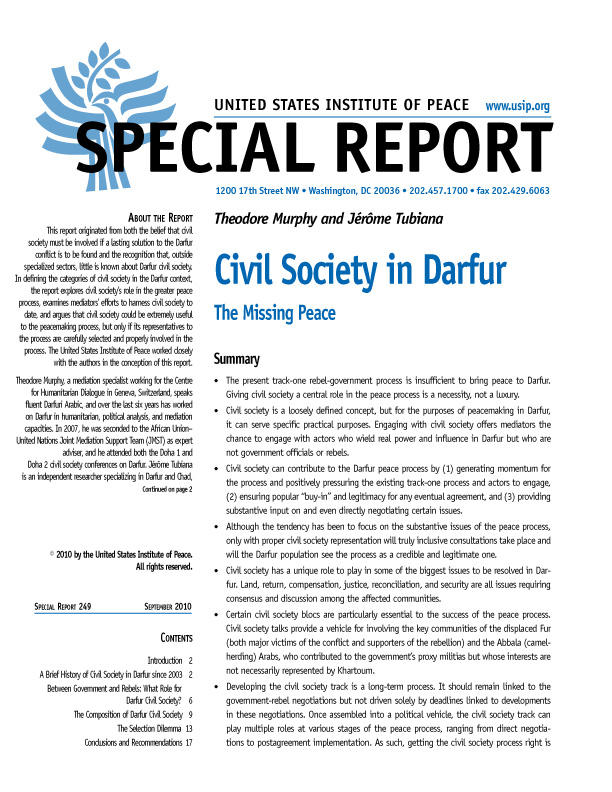This report explores civil society’s role in Darfur's greater peace process, examines mediators’ efforts to harness civil society to date, and argues that civil society could be extremely useful to the peacemaking process, but only if its representatives to the process are carefully selected and properly involved in the process.

Summary
- The present track-one rebel-government process is insufficient to bring peace to Darfur. Giving civil society a central role in the peace process is a necessity, not a luxury.
- Civil society is a loosely defined concept, but for the purposes of peacemaking in Darfur, it can serve specific practical purposes. Engaging with civil society offers mediators the chance to engage with actors who wield real power and influence in Darfur but who are not government officials or rebels.
- Civil society can contribute to the Darfur peace process by (1) generating momentum for the process and positively pressuring the existing track-one process and actors to engage, (2) ensuring popular “buy-in” and legitimacy for any eventual agreement, and (3) providing substantive input on and even directly negotiating certain issues.
- Although the tendency has been to focus on the substantive issues of the peace process, only with proper civil society representation will truly inclusive consultations take place and will the Darfur population see the process as a credible and legitimate one. Civil society has a unique role to play in some of the biggest issues to be resolved in Darfur. Land, return, compensation, justice, reconciliation, and security are all issues requiring consensus and discussion among the affected communities.
- Certain civil society blocs are particularly essential to the success of the peace process. Civil society talks provide a vehicle for involving the key communities of the displaced Fur (both major victims of the conflict and supporters of the rebellion) and the Abbala (camelherding) Arabs, who contributed to the government’s proxy militias but whose interests are not necessarily represented by Khartoum.
- Developing the civil society track is a long-term process. It should remain linked to the government-rebel negotiations but not driven solely by deadlines linked to developments in these negotiations. Once assembled into a political vehicle, the civil society track can play multiple roles at various stages of the peace process, ranging from direct negotiations to postagreement implementation. As such, getting the civil society process right is more important than rushing to meet artificial deadlines driven by the government-rebel negotiations.
- After the first Doha civil society conference, organizing the civil society track of the peace process became the responsibility of the United Nations African Union Mission in Darfur (UNAMID). Donors should do what is necessary to ensure that UNAMID has the resources and capacity to undertake this complex and important task.
- The work of various international actors on the civil society track must be well-coordinated. A close and effective working relationship among the Joint Mediation and Support Team, the African Union High-Level Implementation Panel (AUHIP) for Sudan, and UNAMID is vital.
About the Report
This report originated from both the belief that civil society must be involved if a lasting solution to the Darfur conflict is to be found and the recognition that, outside specialized sectors, little is known about Darfur civil society. In defining the categories of civil society in the Darfur context, the report explores civil society’s role in the greater peace process, examines mediators’ efforts to harness civil society to date, and argues that civil society could be extremely useful to the peacemaking process, but only if its representatives to the process are carefully selected and properly involved in the process. The United States Institute of Peace worked closely with the authors in the conception of this report.
Theodore Murphy, a mediation specialist working for the Centre for Humanitarian Dialogue in Geneva, Switzerland, speaks fluent Darfuri Arabic, and over the last six years has worked on Darfur in humanitarian, political analysis, and mediation capacities. In 2007, he was seconded to the African Union–United Nations Joint Mediation Support Team (JMST) as expert adviser, and he attended both the Doha 1 and Doha 2 civil society conferences on Darfur.
Jérôme Tubiana is an independent researcher specializing in Darfur and Chad, where he has worked as a consultant for various organizations, including the United States Agency for International Development. As a consultant to the JMST, he participated in consultations among Darfuri refugees in Chad and attended Doha 2. He also acted as an expert in Darfur civil society consultations held by Concordis International in the United Kingdom in 2008. He holds a doctorate in African studies.